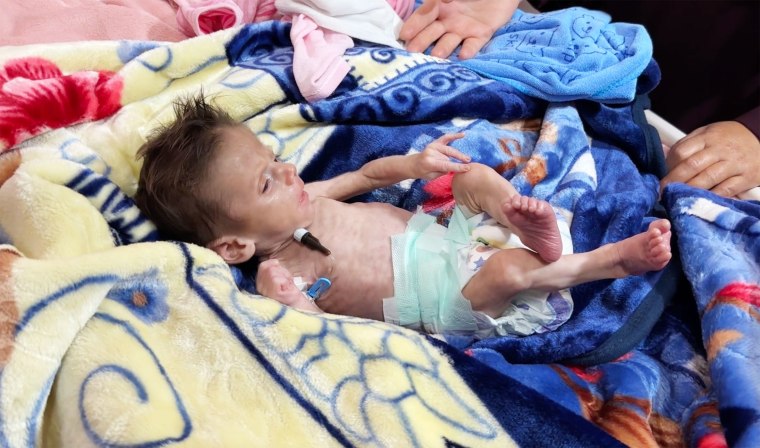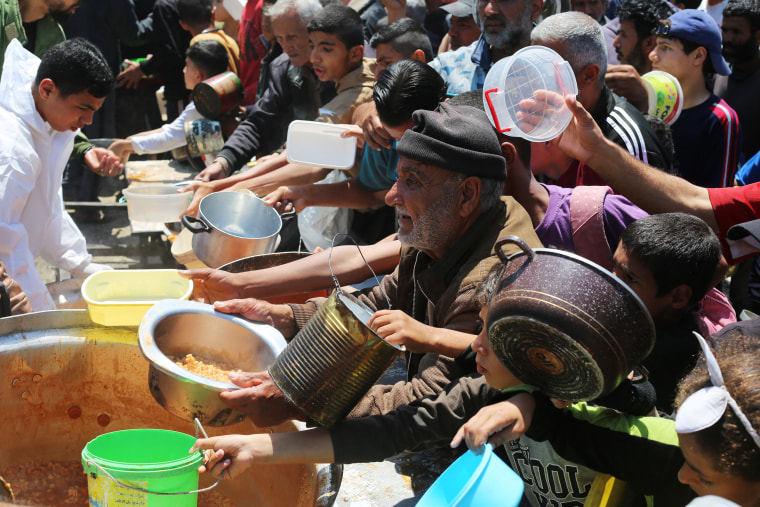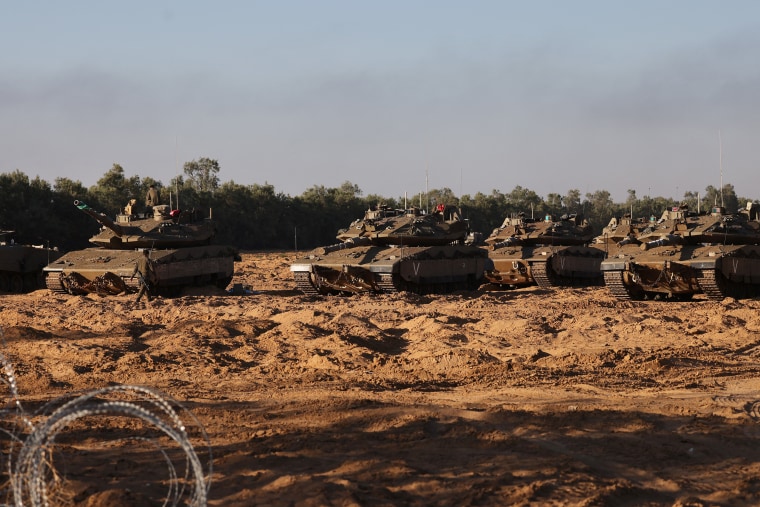As the frail newborn shivers in his mother’s arms, Yussuf Al-Najjar’s parents fear he will leave the world as quickly as he arrived in it.
“His condition is deteriorating,” Nagia Al-Najjar said of her baby Monday in the intensive care ward at Khan Younis‘ Nasser Hospital in southern Gaza. Born prematurely, Yussuf is now suffering from acute malnutrition, with the family unable to obtain formula or medication as Israel’s blockade of aid and goods reaching Gaza enters its third month.
After Israeli Prime Minister Benjamin Netanyahu said Monday that he would give an order to ramp up the military offensive in Gaza with a plan to seize the entire strip, Yussuf’s future is increasingly uncertain. Palestinians and observers fear fresh bombings and displacement, and aid groups warn of a spiraling humanitarian crisis marked by scarce food supplies.
Yussuf is among the 9,000 children in Gaza to have been admitted or treated for acute malnutrition since the war began, with UNICEF saying in March that it had seen a surge in cases. Dr. Ahmed al-Farrah, head of the pediatrics and obstetrics ward at Nasser Hospital, told NBC News last week that more than 50 children had died “from starvation.”
“Isn’t it a sin for a child to die like this?” Al-Najjar, 30, told NBC News’ crew on the ground, her face wracked with grief.

Across Gaza, Palestinians expressed anxiety as they learned of the plan unanimously approved by Israel’s security Cabinet to seize the entire territory in what Netanyahu described as an effort to defeat Hamas.
“We were hoping and waiting for a decision for Israel to end the war against us — not the decision to occupy Gaza and displace its people,” Walid Abu Muhsin, a street vendor from Khan Younis, told NBC News’ crew Monday.
Inside Gaza and abroad, humanitarian and aid groups condemned the Netanyahu-led government’s plans to control Gaza indefinitely and distribute aid to Gaza via “Israeli hubs under conditions set by the Israeli military” once Israel lifts its blockade.
The two goals will “inevitably lead to countless more civilians killed and the further destruction of Gaza,” U.N. deputy spokesperson Farhan Haq said in a briefing Monday in New York.
More than 52,000 people have been killed in Gaza, according to the local Health Ministry, since Israel launched its offensive in the enclave following the Hamas-led Oct. 7, 2023, terrorist attacks, which marked a major escalation in a decadeslong conflict.
Around 1,200 people were killed and more than 250 were taken hostage into Gaza in the attacks, with more than 50 people, both dead and alive, believed to remain in Hamas’ captivity, according to Israeli officials.
The families of hostages who remain held in Gaza have warned that a ramped-up offensive will only put the lives of their loved ones at further risk.

Meanwhile, right-wing ministers in Netanyahu’s fragile government coalition celebrated the plans for an expanded offensive, having advocated for such a move before and after the last ceasefire between Israel and Hamas, which held for two months from Jan. 19 to March 18.
Prior to that ceasefire, the Israeli military had taken control of around a third of Gaza.
Even so, hopes remained in Gaza and Israel for a resumption of that truce ahead of a visit from President Donald Trump to the region planned for next week.
While Trump has repeatedly touted a proposal for the U.S. to eventually take ownership of the Gaza Strip, Palestinians there implored him to take action to halt Israel’s plans for an expanded offensive.
Khan Younis resident Abu Muhsin, 55, asked “Where is Trump who calls for freedom and democracy?”
In Israel, meanwhile, Cabinet Minister Ze’ev Elkin said Monday that a “window of opportunity” remained for talks to resume.

From outside of his Cabinet, Netanyahu has faced growing criticism for resuming and expanding Israel’s offensive in Gaza. The latest denunciation came from Eran Duvdevani, a prominent retired colonel who led a campaign by former and reserve Israeli paratroopers calling for an end to the war.
Duvdevani told NBC News that a growing number of reservists were already rejecting calls to return to service in a war they increasingly view as politically motivated.
He added that without a fresh truce between Israel and Hamas, Trump’s intervention was likely the only thing that could stop an expanded offensive.
“This is the only way, to press Netanyahu,” Duvdevani said in a phone interview early Tuesday. “Nothing will happen if Trump will not press him.”
Meanwhile, a hearing for Netanyahu’s testimony in his ongoing public corruption trial ended early Tuesday, according to Israeli newspaper The Times of Israel. It came as the Israeli military issued an evacuation warning for Yemen’s Sanaa Airport ahead of what appeared to be a pending attack.